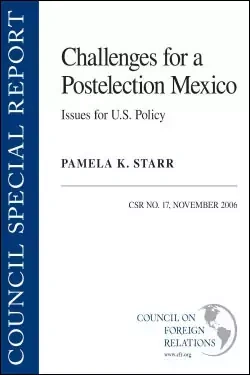
Challenges for a Postelection Mexico
Issues for U.S. Policy

- Council Special Report
- Concise policy briefs that provide timely responses to developing crises or contributions to current policy dilemmas.
Overview
The contentious July 2006 Mexican presidential election has placed Mexico squarely back on the U.S. foreign policy agenda.
Following months of unrest in which supporters of Manuel López Obrador staged massive protests, accused their opponents of electoral fraud, and threatened to form a parallel government, election authorities have declared PAN candidate Felipe Calderón the legal victor. The stakes for the United States are high. In recent years, Mexico has become an important U.S. ally, promoting freer trade and market economics in a region increasingly characterized by left-leaning, nationalist governments. A prospering Mexico can help Washington advance national security, fight drug trafficking, control migration, and ensure energy security. Managing these issues has become more difficult in light of the hardening immigration debate in the United States, and a divided Mexican electorate that is not as well-disposed to cooperation with its northern neighbor as it was five years ago.
More on:
This report details the economic and political obstacles awaiting president-elect Calderón and sketches the institutional environment that will define his room for political maneuver. Because of the controversy surrounding the election, Calderón possesses a limited mandate and will feel compelled to seek compromise with opposition groups. The report identifies the likely consequences of the bitterly fought 2006 campaign for democracy and economic reform in Mexico and for Mexican relations with its hemispheric neighbors and with the United States. It gives particular attention to the election’s impact on U.S. efforts to control its southern border, enhance the competitiveness of the U.S. economy, and fight drug trafficking. Finally, the report offers concrete policy recommendations to the U.S. government on how to help Mexican authorities move past the electoral dispute and confront their country’s many complex challenges.
Download the Spanish translation of this report [PDF].
Download the Spanish press release for this report [PDF].
More on:
 Online Store
Online Store
